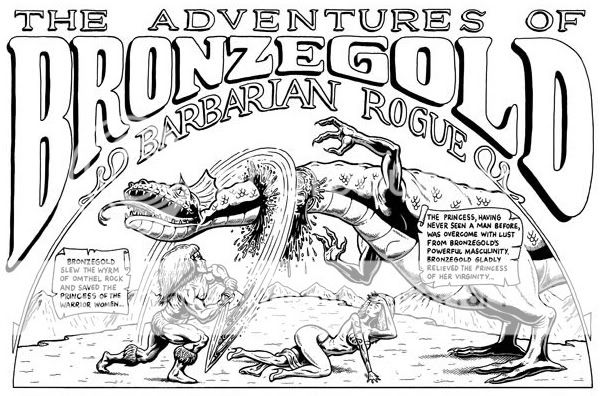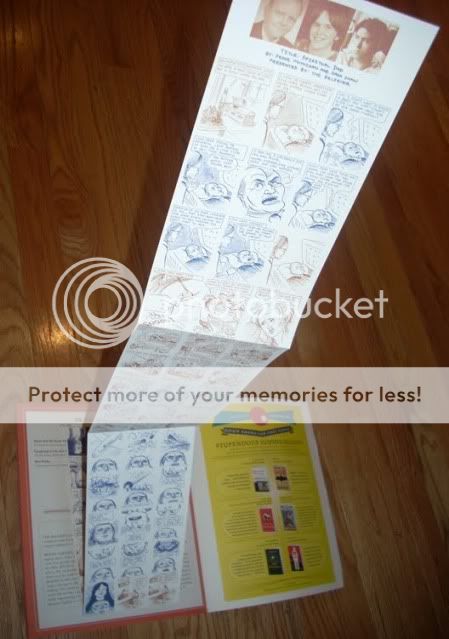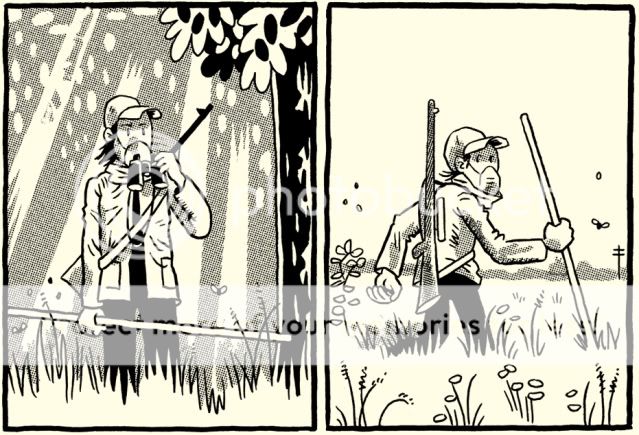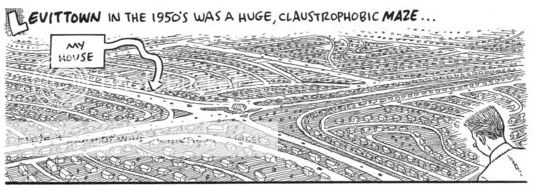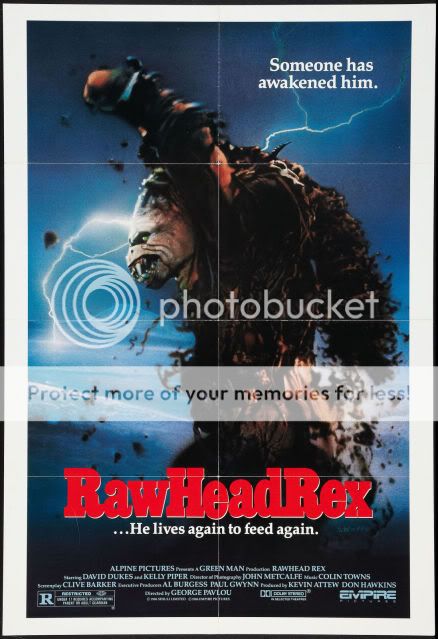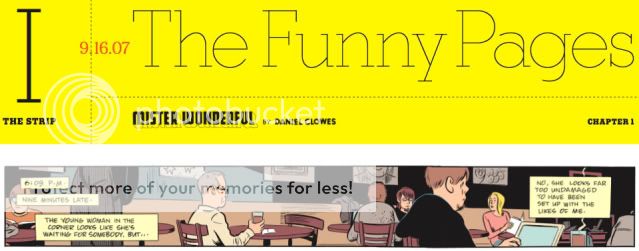Archive for May 6, 2010
Carnival of souls: Special “NERDS!!!!!!!!” edition
May 6, 2010* Against nerd-culture hegemony: Parts one, two, three, four, five, etc., etc….
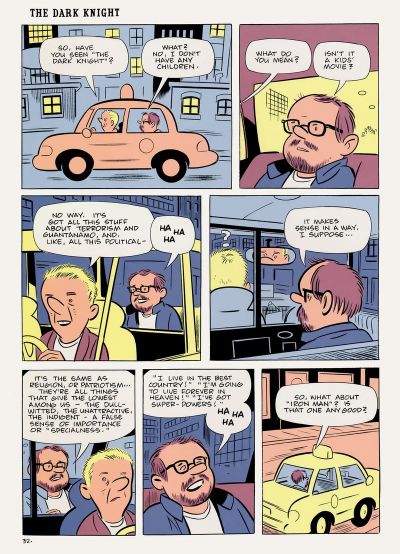
* Seriously, read Matt Zoller Seitz’s anti-superhero-movie piece in Salon. It’s no secret what an admirer of Seitz’s I am, but I hope you’ll believe me any way that it’s a cut above the screeds you’ve seen along these lines from, I don’t know, Roger Ebert or Ron Rosenbaum, or a Comics Journal message board user in 2002, or whatever. It’s the kind of thing where you can disagree with several of his specific assessments of superhero movies–I love Burton’s Batman and hate Spider-Man 2, just for example–and still agree wholeheartedly with his conclusion. For me, the prosecution could present the Fantastic Four movies as Exhibit A in The People vs. Superhero Movies and rest their case immediately–you have access to the definitive work of one of the greatest visual thinkers in any medium of the entire 20th century, and that’s what you come up with? Anyway, I talk a bit more about Seitz’s piece on Robot 6. Suffice it to say I’ve been thinking and chatting a lot about the goonish conservatism of nerd culture for the past few days–ever since Wilson came out, I believe–so this piece was a nice bit of synchronicity.
* Elsewhere on Robot 6: Sexy superhero art from Canadian cartoonists. Here’s Jillian Tamaki’s Catwoman:

* Comic-Con’s David Glanzer talks to Kiel Phegley about the Con’s big decision on location. I was struck to see him publicly batting down at least one claim made by L.A. Inc’s Michael Krouse in that Jeremy-Piven-in-Entourage interview yesterday. Also, to hear Glanzer tell it (and contra Krouse and Chris Butcher), San Diego’s offer was a fine one, although of course that’s what he’d say.
* Actual, honest-to-God new reader Curt Purcell says Blackest Night was plenty new-reader friendly, thank you very much, for whatever its other faults.
* Tom Neely is the best there is at what he does.
* Despite its lack of anything from The Wizard of Oz (flying monkeys!!!), this list of disturbing moments in kids’ movies from Topless Robot’s Ethan Kaye has a strong blend of iconic horrors (Willy Wonka’s tunnel is the predictable and deserving #1, you’ve got the Child Catcher and Bambi’s mom) with offbeat and personal choices (the clown nightmare instead of Large Marge in Pee-Wee’s Big Adventure, also-ran animated features like Scruffy and The Black Cauldron, which reminds me I wanna reread the Prydain Chronicles).
Lost thoughts extra
May 5, 2010In addition to the usual enlightening back-and-forth, in this week’s Lost thoughts comment thread you fan find a couple of observations from me regarding last night’s episode that occurred to me since I wrote the original post last night. They’re on the meatier side, and normally I’d have created a second full-fledged post for them, but I didn’t want to derail the discussion. Check them out, and please weigh in if you’d like.
Carnival of souls
May 5, 2010* San Diego Daze Part One: Sure, I guess contacting the Comic-Con organization for an explanation of their exhibitor badge rate hike is one way of exploring the story, Tom, or should I say Mr. Fancy-Pants.
* San Diego Daze Part Two: Los Angeles’ chief spokesman in its effort to win Comic-Con away from San Diego, Michael Krouse, really does come across like something out of The Player in this interview with Kiel Phegley.
* San Diego Daze Part Three: In no uncertain terms, Chris Butcher stomps all over the idea that San Diego has been a good host to the Con.
* Rich Juzwiak liked the Nightmare on Elm Street remake–for bringing some gravitas to Freddy, of all things–but for me the money quote in his review is this:
Some time during, oh, the fourth Saw flick or so, this much should have been clear to even the most ardent horror defender: we’re the ones who are really being tortured. We slog through so much garbage and for what? To find that rare diamond in a rough like back in the VHS days? To see just how far cinema will go to freak us out and make us squirm? To actually freak out and squirm? Because being smarter than garbage beats being dumber than art? I don’t know really what the point is (probably a little from each of the presented scenarios), but I know that I’m a gleeful masochist.
“Because being smarter than garbage beats being dumber than art”–friends, is that a tagline for all of nerd culture?
* Real Life Horror: It’s like something out of the movies, only not really; we dodged a bullet this time, but for how long?
* This is an extraordinary album cover.
* I…I don’t even know what to say about this. I really don’t. Words fail.
Comics Time: Wilson
May 5, 2010Wilson
Daniel Clowes, writer/artist
Drawn & Quarterly, April 2010
80 pages, hardcover
$21.95
All apologies to Ken Parille, but I don’t think the kaleidoscopic array of styles in which Daniel Clowes drew Wilson says much of anything. I think that’s the gag. And I mean this aside from the fact that these are all styles you saw Clowes employ (and no duh–as with Ware, it’s almost boring at this point to mention that the guy is an absolute titan of craft) with full shock-of-the-new force in Eightball #22/Ice Haven, where the Sunday-funnies format made their import a lot clearer. Here, it’s like Thirty Two Short Films About Some Dickhead, or that guy who pointed out that all New Yorker cartoons are funny if you caption them with “Christ, what an asshole.” Draw it how you will: Wilson’s always there, in medium close-up more often than not, a wide-eyed and open-mouthed expression of guileless wonder on his face more often than not, saying something fucking horrible almost constantly. No matter how you shake and dance, the last two drops go in your pants; no matter whether he’s detailed or abstracted or realistic or cartoony or full-color or two-tone or black-and-white or whatever the hell, Wilson is a massive, massive tool.
Wilson is sort of like the refined, sharpened, weaponized version of Mister Wonderful. Marshall is self-absorbed, Wilson is self-absorbed and cruel. Each single-page unit of Mister Wonderful is paced like a gag strip; the same is true of Wilson, only there are four times as many of them, and they’re at someone’s expense. There’s hope for Marshall; Wilson ends on a note akin to The Godfather Part II. Mister Wonderful is funny; Wilson is hilarious–I read this on the train and was embarrassingly vocal in my enjoyment of it. The second I got to a computer I made “PROPERTY OF SIR D.A.D.D.Y. BIG-DICK” my Google Chat status, I emailed my friends the entirety of Wilson’s disquisition on The Dark Knight, and even now I can’t think of “Hey, it talks!” without laughing out loud. Marshall is preoccupied with making a connection with someone outside himself, even if he’s constantly hamstringing his attempts to do so; the only times Wilson appears able to take that step is when death has rendered it too little, too late. This book is utterly mean and hilarious, and I loved every page.
Lost thoughts
May 4, 2010SPOILERS, SPOILERS, SPOILERS, SPOILERS
* The strange thing about episodes at this stage is that you can’t really be shocked by any deaths, because you only have four episodes to go including tonight’s and this show being what it is you know some major characters are going to die, while moreover there are only so many left to kill. It’s not like early on where every death was a stunner because whoa, they killed a main character; it’s not like later where you knew what they were capable of but never were quite sure when or on whom the ax would fall. Now the only question is, like, will Kate’s bullet wound be fatal, or will Sawyer’s charge of the Light Brigade give him the blaze of glory we’ve all be reasonably sure he’s been heading for.
* Turns out the answer in both cases is no, which I’m glad for; I didn’t expect Sawyer or Kate to die this early, not really, but nor did I expect Jin and Sun to die at all. That strikes me as a real gutpunch to the show’s own emotional core. Jin and Sun episodes were as constant as the sunrise.
* What I’m really glad about is the final scene with the castaways, where you finally have them react to loss the way people in the real world react, which is to cry. When Hurley broke down…yeah, that was a toughie.
* I’m glad Sayid was redeemed in the end, via one of the show’s favorite paths to redemption, volunteering to take the brunt of a bomb blast. It was good to have old, calm, expert Sayid back one last time. Plus, “It’s going to be you, Jack.” Nice and cryptic.
* I felt bad for Jin and Sun’s kid. I spent most of that scene figuring Sun would finally say “you have to live for Ji Yeon” and Jin would reluctantly swim to safety. As it turns out they didn’t appear to be thinking about Ji Yeon. Sorry, kid.
* Jack being right about the bomb was a step in the redemption direction for a character that fans and fellow characters alike have written off as a habitual fuck-up, so of course I liked that.
* I figure Lapidus will live to quip another day. Or not, I don’t really care, he was kind of a waste of time all told. It’s nice that he was genre-y, but so what.
* I know that the flashsideways material should feel like an afterthought or an also-ran in an episode like this, but it didn’t. Those right there are your two central characters hashing some major things out. That scene in the hospital hallway at the end, where John laughs at the notion of letting go, is one of my favorites in the whole history of the show.
* I was also very happy, for some reason, to see Jack meet Helen. Somehow that makes Locke’s happiness more real…?
* Did you notice the editing that suggested Jack was dreaming of his flashsideways self?
* Glad to get rid of the miscast dougy scientist Widmorian. (Widmoron?)
* So how long has the MIB’s plan been in effect? Just recently, or was he trying to get other people to kill off the Candidates, or get them to kill each other, all along? Maybe he needed to bump off Jacob first and only then was it worth going after the Candidates. I suppose that makes sense.
* Where was Widmore during the various fracases?
* I wonder if we won’t get the big “here’s the secret history of the Island and Jacob and the MIB” until the “two-part series finale,” i.e. not next episode but the episode after that.
Carnival of souls
May 4, 2010* The San Diego Comic-Con is raising the price of extra exhibitor badges from $75 to $200? That’s a massive year-to-year increase, that’s for sure, though I know so little about the economics of the Big Show that I hardly feel equipped to comment. My first instinct is that yes, this is a way to price out smaller exhibitors to make more room for the big guns given the lack of elbow room the show now has, but I’d be happy to be persuaded otherwise as I find the show a generally admirable organization in terms of its attempts to balance art and commerce and the needs of a wide variety of media and fandoms. (Via Kevin Melrose.)
* Rest in peace to the front-of-Previews comics internet’s greatest troll, Alan Coil.
* Recently on Robot 6: Rollins Loves Danzig, Shaw and Moynihan Love Lost, and He-Man and Tron love men.
* Benjamin Marra barbarian action as you like it!
* Lots of interesting RPG talk in the comments for yesterday’s Carnival, including a special guest appearance from a member of my old war party, cartoonist Davey Oil. Another such august personage, AllTooFlat.com’s Kennyb, weighs in on his tumblr.
* Won’t you please check out last episode’s Lost thoughts thread before rejoining us this evening? Wow, are there only four episodes left of the whole series, or am I miscalculating?
Carnival of souls: Special “dual must-reads” edition
May 3, 2010* Ready to have your guts totally ripped out? Read Tim O’Shea’s interview with Driven by Lemons‘ Josh Cotter. I am at a loss for words as to what even to say about it, except this: Josh, if you’re reading this, you stepping away from comics would be a disaster for comics. This is a MUST READ.
* Sylvester Stallone is 99% sure he won’t make a fifth Rambo movie. I’m fine with that. More fine if he was gonna go in the “Rambo vs. genetically engineered soldier-monster” direction he’d mooted, less fine if he was gonna go in the “Rambo vs. Juarez” direction, but basically fine either way because how do you top the last one?
* Dash Shaw and Jesse Moynihan teamed up to do a three-feet-tall comic strip about Lost for the new issue of The Believer? Yes please.
* I’ve got something to say: Go buy Henry & Glenn Forever, the new collection of romantic gag strips starring Henry Rollins and Glenn Danzig by Tom Neely and his Igloo Tornado compatriots. Don’t think about it–do it!
* Recently on Robot 6, a pair of links swiped from Comics Comics: Dan Nadel & Paul Gravett’s Jack Kirby art show and the music of the ’60s Spider-Man cartoon. Frank Santoro, if you’re reading this, check the comments to that last post.
* Although it seems as un-spoilery as possible, Kiel Phegley’s interview with Mike Mignola about the next cycle of B.P.R.D. stories is still, you know, an interview about the next cycle of B.P.R.D. stories, so caveat lector.
* Kevin Huizenga appears to be serializing his story “Rumbling” on Jordan Crane’s gorgeous webcomics portal What Things Do–here’s the stuff that’s already been published in Or Else and a minicomic, iirc.
* Here’s a comic by Bill Griffith about Levittown, the town on Long Island where my wife and I now live. (Via JK Parkin.)
* Kate Beaton does Macbeth. Gee, whichever strip shall I choose to illustrate this link?
* Curt Purcell continues his Blackest Night retrospective with a salute to the superheroic state-of-the-art visuals of Ivan Reis and Doug Mahnke and his personal issue-by-issue breakdown of how the event would best be read, collected, and thought about. My superhero-centric readers are really gonna wanna read both.
* Like basically everyone else, Jason Adams thought The Human Centipede was much ado about bullshit, as the aforementioned Bard once put it, I think.
* Jason also reviews the remake of A Nightmare on Elm Street, a cautionary tale of what happens when imaginationless people make a movie about the power of the imagination.
* I’m always game for a genre-trash poster-art gallery. Thanks, Monster Brains!
* The BBC interviews the great choral composer Eric Whitacre about his now-viral “virtual choir” video for his song “Lux Arumque.” I could not love Whitacre’s music more.
* Your quote of the day:
“It’s so funny because when the economy first started collapsing, everyone was freaking out and asking when comics would be hit, but now that things have really taken a toll on sales, no one is saying shit about it.”
–a friend of mine on Marvel’s month-to-month sales analysis for March 2010.
* Jiminy Christmas, this is an absolutely epic Playing D&D with Porn Stars posts on the myriad ways to “railroad” your players, i.e. to leave them with little or no choice but to do exactly what you want them to do. Seriously, I saved it for last so you can immediately go and read the whole thing yourself (after listening to the Whitacre interview of course).
Zak’s thesis, which I take it is derived from a considerable body of thought and writing on RPGs, is that between a full-fledegd railroad and its opposite, a “sandbox” in which anything the players want to do goes, there are infinite gradations. Thinking back on my one glorious D&D campaign, I’m not sure how to characterize it using Zak’s terminology, because what my DM–the great Bill DeFranza, who I’m told is now professionally writing RPG material so look out, suckers–did was, over the course of months and I think even years (before I joined the campaign), deceive the players as to what was going on via a non-player character who was secretly a total bastard. Essentially, our ragtag group hooked up at some point with a mindflayer named Oolitek who, despite what we knew of his race’s proclivities, seemed to be a stand-up guy. In addition to helping us out of jams and giving us advice, he would actually say emotionally involving and moving things to us about issues in our characters’ lives. Seriously, I loved this dude. Alas, it turned out he was manipulating us all along to slowly eliminate major monsters, magic users, and power centers so that he and his cohorts could apocalyptically blot out the sun and unleash the Underdark upon the surface world, which is precisely what ended up happening. Now, were we steered toward this conclusion? Without a doubt. Once we took down the last major obstacle for Oolitek’s plot–a beholder, iirc–could we have stopped it no matter what we did? I sort of think not; I had some sort of disintegrator ray-gun I stole from an off-world spaceship that had crashed (leading to a lot of confusion for my medieval-level mind), and even though I missed when I blasted the big doomsday device Oolitek’s pals had constructed, I sort of doubt Bill would have let me gum up the works in the end. But none of us minded, because it was such a great story, and moreover one that was totally contingent on our group’s desire to Do Good in the wake of a variety of lousy personal choices each of us had made in the past. Plus, we could have avoided it all along if we’d, you know, never trusted a fucking mindflayer.
Anyway. Personally, I think you can apply many of Zak’s lessons about railroading directly to fiction writing. Sure, your characters don’t have the autonomy that real-live player characters in a role-playing game have–but wouldn’t you like it to feel like they do?
Comics Time: Mister Wonderful
May 3, 2010Mister Wonderful
Daniel Clowes, writer/artist
The New York Times, September 2007-February 2008
20 pages
Download it for free from The New York Times
The key sequence in the comic Dan Clowes serialized through The New York Times‘ Funny Pages section a couple years back (!!!) comes in its October 28th. 2007 installment. Up to that point, and afterwards in fact, you could fairly comfortably play the theme song to Curb Your Enthusiasm in the background while reading and get roughly the right effect. The titular character, a graying sad sack named Marshall, is so self-obsessed in a self-deprecating manner that it’s almost a mental illness. In a series of one-page sequences he waits for a blind date he’s increasingly sure will never arrive, mentally lashing out at himself and his fellow coffee-shop patrons in a torrent of caption boxes that superimpose themselves on action and dialogue alike. Clowes’s comedic pacing is drum-tight, his portraiture hilariously scathing, able to capture the pleading vulnerabilites of a human face and then exploit them ruthlessly. You’re left wondering if this will ultimately be as biting a portrait of a pathetic, bitter guy as was The Death-Ray (only, you know, with no ray guns).
Things don’t exactly improve when Marshall’s blind date, a lovely if seemingly scatterbrained woman just shy of 40 named Natalie, actually shows up. Marshall, who at this point is half-drunk, immediately begins constructing elaborate fantasies of their happy life together, basically calling her the most perfect person who ever existed–the better to preemptively excoriate himself for blowing it with every fumbled word or body-language cue. Most of what she says to him is obscured by his interior-monlogue captions: Immediately after thinking to himself, “O.K., Marshall — now’s the perfect time to show what a sympathetic and attentive listener you are — eye contact, Marshall! Concentrate!”, he interrupts a word balloon containing the story of her failed marriage with a giant block of narration beginning “So here’s the basic gist:”. It’s smart cartooning, as you’d expect from Daniel effing Clowes, and it’s nasty and funny, as you’d also expect.
Then something unexpected, and subsequently unremarked-upon, happens. Marshall relates to us the story of Natalie’s common-law marriage, a 15-year relationship that began in grad school and ended when she could no longer forgive her boyfriend’s laughing dismissal of her worry that their lack of an actual marriage or children meant he was ashamed of her. It’s just a four-panel sequence, but it’s done in these lovely glacial blues, and there’s this gut-wrenching effect Clowes uses to convey the idea that “every time she went into that room, the laugh was there”: A large, three dimensional, yellow block-letter “HA HA,” first sitting on the kitchen table, then towering over the whole room like a monument.
It’s not made explicit, but here’s the thing: This isn’t Natalie’s memory of the disintegration of her relationship. This is Marshall’s mental reconstruction of Natalie’s story, pitched to us with the same no-bull neurosis as everything else he’s told us so far. Only it’s beautiful, it’s thoughtful, it’s sad and crushing. For these four panels only, all traces of Marshall’s compulsive self-absorption and solipsism are gone. Whatever he thinks of himself in the moment, we know he really did empathize with Natalie, he really did listen attentively, he really does care about her not as an idealized ticket out of his miserable lonely life, but as a person with a story all her own. For all the Larry David humor and brutal caricature in here, that’s the beating heart of the story, hidden under all the black. I think it’s worth remembering the next time you hear someone dismiss Clowes as a misanthropic self-loathing crank. Mister Wonderful is a story about the need to cling to one another in the face of not just the world’s awfulness but also your own, because what else are you gonna do? It doesn’t skimp on the awfulness, but the clinging’s the point.




